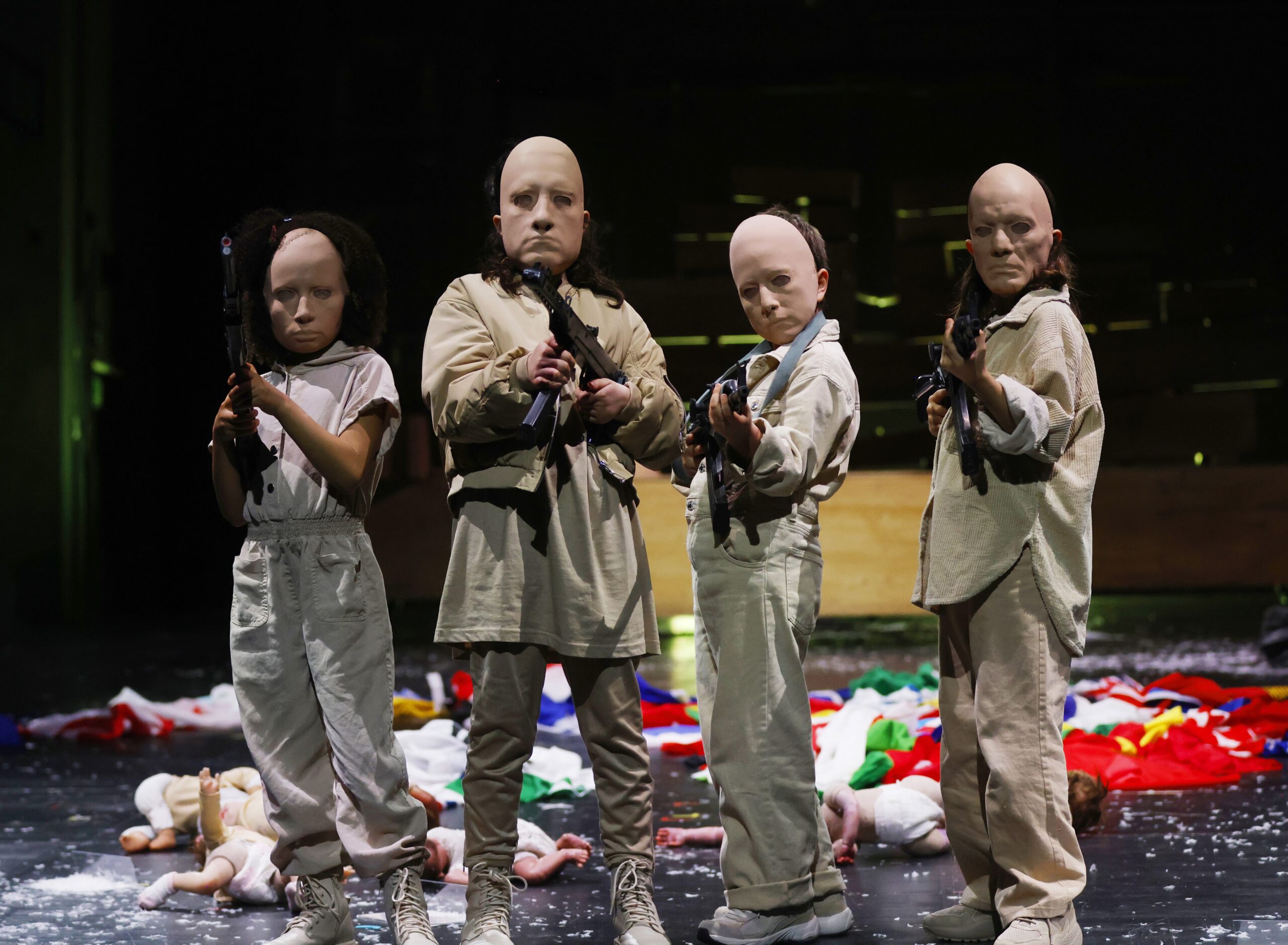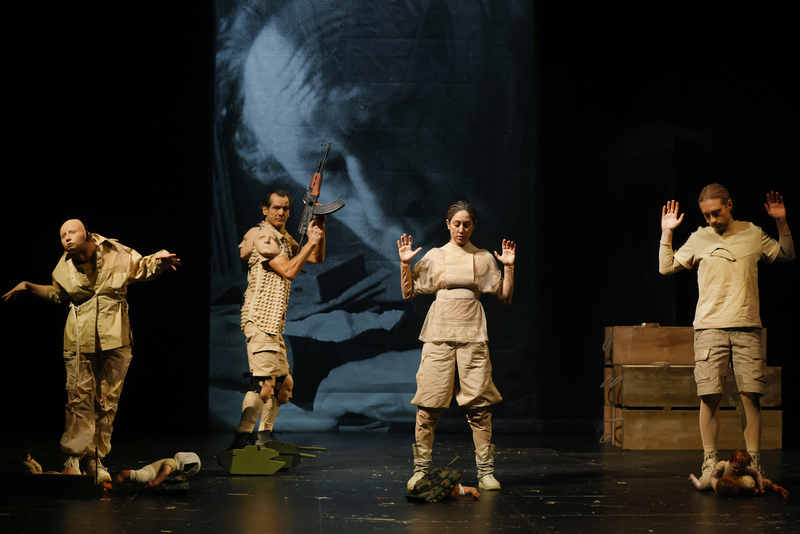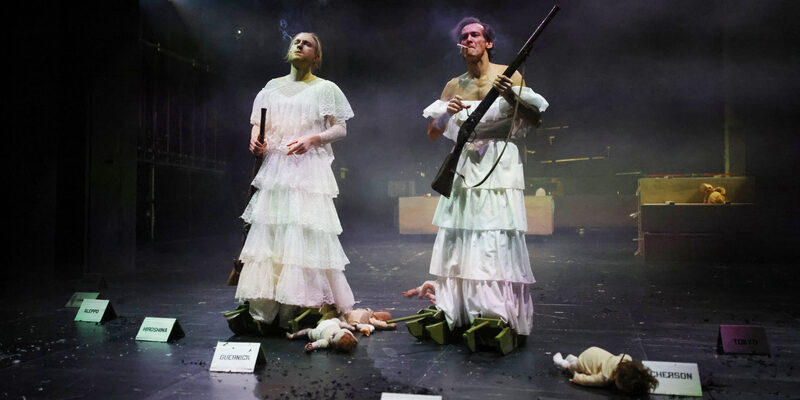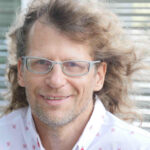Maxim Gorki Theatre, Berlin, premiere 25th March 2023
With Schlachten, the Croatian director Oliver Frljić digs deep into the eternal entanglement of mankind in war. The dystopian piece, based in part on a collage of texts by Heiner Müller, focuses especially on recruitment and mobilization techniques both in combat zones, and in societies more distant to the front line.
Making theatre about war in the middle of a war is a tricky business. People who go to the theatre to see a war play will often be deeply absorbed in the current news cycle; they will often have already drawn their own conclusions and will be looking to the stage for something that, above all, confirms them.
Frljić, fortunately, doesn’t do exactly do this in his new play. Rather he puts himself between most of the conceivable positions when it comes to the war in Ukraine. This may not go down well with some sections of the audience but it is worth seeing despite, or maybe even because of this.
Schlachten – in German the plural of battle, but also the activity of slaughter – is the third part of Frljić’s war trilogy at the Maxim Gorki Theatre. It follows Danton’s Death/Iphigenie, in which he focussed on human sacrifice as a fuel for both war and revolution. The second part, Mother Courage, was a rather feeble and pedagogic interpretation of Brecht’s play. In the final part of the trilogy he turns to Heiner Müller.
This is always a good choice. Müller knows about wars, his language is poetic, very clear and, with all its clarity, rarely unequivocal. Wolokolamsker Chaussee – after the novel of Alexander Bek -, Germania 3 and Philoktet – after Sophocles -, are the most mined texts in the Müller universe in this performance, and Frljić also contributes his own interludes.
On stage there are four performers. Vidina Popov and Marina Frenk appear first as clown-like figures, spat out off the side doors like medieval ghosts. Later, they will inhabit several roles, with Popov’s wide range of emotion-stirring techniques proving one of the strongest forces of the performance. Tim Freudensprung and Mehmet Yilmaz have one great moment in a scene from Wolokolamsker Chaussee, but mainly they act as a supporting chorus for their female colleagues.
In the beginning, the stage is empty, with various war-related items appearing, such as a Kalashnikov or miniature tanks as shoes for the performers. But, in the end, Frljić’s long-time stage designer Igor Pauska has no better idea then to place a mountain of coffins in the back of the stage.

Schlachten at Maxim Gorki Theatre. Photo: Ute Langkafel MAIFOTO
Not that it matters, because it is the discourse and not so much the images, which form the core of this production. The historical tour de force begins with Stalin, the mustachioed-dictator still babbling about the “new man” – a future project, after all, for the achievement of which every sacrifice, every terror seems to be excusable. In a perverse twist, loyalty to this vision of the better man can only be proven through the use of ever-increasing terror against those who don’t go along with it fully.
The successor to the dictator’s chair, Vladimir Putin, doesn’t even have such a vision. He only wants to restore the old, though he perfectly understands the escalation game between terror and loyalty. And because, in Müller’s interpretation, even Stalin had the suspicion that his terror-driven vision alone was not suitable for permanent mobilization, he was happy about the tactics of his contemporary with the smaller moustache, Adolf Hitler. According to Müller, as well as Frljić, the cruller the German advance, the more sympathy for Stalin. Actors wearing the cardboard heads of Stalin, Hitler and Trotsky dance happily on stage.
Then Frljic breaks down the great mobilization discourse into a single scene from Wolokolamsker Chaussee. A commander uses the self-mutilation of a soldier as a catalyst to unite the hordes of people under him into a battalion. The blacksmith’s hammer is the firing squad, made up of comrades of the condemned man. The rest of the troupe watches this initiation experience. It is clear there is no longer a way back to the law and morality of civil life, for those who join in and also for those who stand by and do nothing. The extasy of battle is the only way out.
Müller read the work of author and soldier Ernst Jünger and he put Jünger’s delight about war into the bigger power structures. And Frljić, with his own experiences of the turmoil of the Balkan wars, is surely familiar with such brutalization practices. In Germany, people tend to attribute these brutalities mainly to the “others”, the opponents. Therefore one reading of Schlachten is a kind of renewal of Soviet atrocities, now in the form of the Russian occupation. But Frljic also puts in a scene, where – accompanied by the tune of John Lennon’s Imagine – the actors speculate about the Iraq war, and whether the US, because of the fabricated basis for starting the war, should also be subject to sanctions, like Russia is now. Of course, these are different cases, but a strong international law should treat every power equally and the reputation of international law institutions, at least viewed from the perspective of the global South, has dwindled, because for the super power of the global North they very obviously do not apply the same rules as they do for others.
Frljić makes the case for such a strong international law in the programme which accompanied the show, but on stage this kind of argument is less visible.
On the contrary the ensemble burrows deeper and deeper into the rotten morale that war produces. The Philoktet story – about super weapons and super betrayal – is literally run through by Vidina Popova and Marina Frenk in a very intense scene about a Croatian SS soldier, who, during his getaway from the rolling Red Army, crosses path with the widows of German soldiers who beg him to kill them before the Russians (and Ukrainians, Tatars, Belarus or Georgians) arrive. But they also reconstruct the social order with them as the elite, and the Croatian soldier as a servant. An order that was broken, at least partly, during the war. Frljić reminds us that this is also part of the attraction of war – an attraction that privileged people in Berlin’s audiences tend to ignore.
Frljić’s Schlachten is at its most vibrant if it is perceived not only as a dark portrayal of the atrocities of war, but also as a very precise account of how war not only creates victims over here and brutal aggressors over there, but also changes the “good guys”.
“Like the black earth of the steppes, war is a fertile breeding ground for internally disturbed people who thirst for borderline situations like a sunflower thirsts for light,” wrote the Polish writer Szczepan Twardoch in his reflections on visits to the front in Ukraine. With clearly stated sympathy for the just cause of Ukraine, Twardoch also provides insights into the minds of those in the combat zone, which oscillate between being disturbed and clear-headed. Twardoch’s most recent text, published by the Swiss paper Neue Zürcher Zeitung over the weekend, proved a congenial companion piece to this production.
On stage, Vidina Popov plays the host of a show in which “Germany is looking for the next top victim.” The selection ranges from ‘small’ wars – such as the Bosnian one – through to large ones – Iraq, Syria and Ukraine – to the current earthquake catastrophe in Turkey and Syria. The system, which hops from one catastrophic event to the next without ever attempting to change anything about the causes, is mendacious.
Unfortunately, the production once again lags behind its own accompanying material. In an interview, the political scientist Nicole Deitelhoff advocates for procedures, practices and structures that resolve conflicts non-violently. The show, however, continues to fuel the violence. Frljic is heading into a hopeless situation, which was true of the late Müller, the one from Germania 3, the piece with which he was still struggling, when he died from cancer 28 years ago. So it is only logical when Popov’s host seeks advice directly from Müller – and does not get a satisfactory answer.

Schlachten at Maxim Gorki Theatre. Photo: Ute Langkafel MAIFOTO
Frljić is seeking these answers himself, digging even more deeply into the distant past. He lets the loudspeakers vibrate with the voice of German emperor Wilhelm II., when he called for mobilization for the “great war.” The funny thing about this speech is that it was not recorded when originally spoken, but some years of later. So history is already being staged in historic documents – a pity, that Frljić does not exploit this thrilling detail.
After the speech, children appear on stage – probably as a sign that the next generations will also be drawn into the juggernaut of slaughter and war. There seems no way out, despite everything we know and experience.
Frljić invites the audience into this zone of despair. The lights in the auditorium are not dimmed. Projections lighten the space, allowing actors and audience to inhabit the same zone. It is an attempt to break the barrier between the viewer and the viewed, in theatres of art and war. Besides a lot of images of war, a list of the wars in which mankind has fought is also projected onto the ceiling and walls. They are not put in a timeline, but ordered according to the number of victims. Wars from all continents, from the Middle Ages, from ancient times and the last two centuries come close to each other in a wave of perpetual, eternal slaughtering.
Oliver Frljić has no answers, but he also doesn’t pretend to have any. This makes Schlachten a very honest work. And a very sad one. There is no way out.
For tickets and more information, visit. Gorki.de
Further reading: interview with Oliver Frljić: “Theatre is what happens in the heads of the audience”
Further reading: Review of Mother Courage and Her Children at Maxim Gorki Theatre
Tom Mustroph works in Berlin and Palermo as a freelance journalist and dramaturg. He operates in several journalistic fields, such as theatre, fine arts and sports. He is most interested in how self-responsible work can succeed elegantly and in accordance to minimal moral standards. He collaborates with several German language publications such as taz, FAZ, Neues Deutschland, NZZ, Theater der Zeit, zeit online, Deutschlandfunk and WDR.








